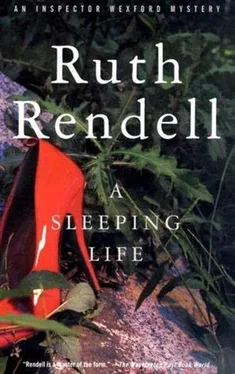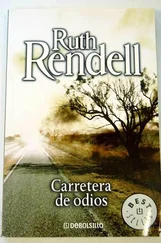Ruth Rendell - A Sleeping Life
Здесь есть возможность читать онлайн «Ruth Rendell - A Sleeping Life» весь текст электронной книги совершенно бесплатно (целиком полную версию без сокращений). В некоторых случаях можно слушать аудио, скачать через торрент в формате fb2 и присутствует краткое содержание. Жанр: Детектив, на английском языке. Описание произведения, (предисловие) а так же отзывы посетителей доступны на портале библиотеки ЛибКат.
- Название:A Sleeping Life
- Автор:
- Жанр:
- Год:неизвестен
- ISBN:нет данных
- Рейтинг книги:3 / 5. Голосов: 1
-
Избранное:Добавить в избранное
- Отзывы:
-
Ваша оценка:
- 60
- 1
- 2
- 3
- 4
- 5
A Sleeping Life: краткое содержание, описание и аннотация
Предлагаем к чтению аннотацию, описание, краткое содержание или предисловие (зависит от того, что написал сам автор книги «A Sleeping Life»). Если вы не нашли необходимую информацию о книге — напишите в комментариях, мы постараемся отыскать её.
A Sleeping Life — читать онлайн бесплатно полную книгу (весь текст) целиком
Ниже представлен текст книги, разбитый по страницам. Система сохранения места последней прочитанной страницы, позволяет с удобством читать онлайн бесплатно книгу «A Sleeping Life», без необходимости каждый раз заново искать на чём Вы остановились. Поставьте закладку, и сможете в любой момент перейти на страницу, на которой закончили чтение.
Интервал:
Закладка:
She murmured, ‘Nearly a year.’
‘A flick knife, I suppose. The kind with a concealed blade that appears when you press a projection on the hilt. Where is that knife now?’
‘I threw it into the canal at Kenbourne Lock.’
Never before had he so much wished he could leave someone in her position alone. He opened the door and called to Loring to come in. The girl bunched her lips over her teeth, straightened her shoulders, her face very white.
‘Let us at least try to be comfortable,’ said Wexford, and he motioned her to sit beside him on the sofa while Loring took the chair she had vacated. ‘I’m going to tell you a story.’ He chose his words carefully. ‘I’m going to tell you how this case appears.’
‘There was a woman of thirty called Rhoda Comfrey who came from Kingsmarkham in Sussex to London where she lived for some time on the income from a football pools win, a sum which I think must have been in the region of ten thousand pounds. When the money began to run out she supplemented it with an income derived from blackmail, and she called herself West, Mrs West, because the name Comfrey and her single status were distasteful to her. After some time she netted a young man, a foreigner, who had no right to be in this country but who, like Joseph Conrad before him, wanted to live here and write his books in English. Rhoda Comfrey offered him an identity and a history, a mother and father, a family and a birth certificate. He was to take the name of someone who would never need national insurance or a passport because he had been and always would be in an institution for the mentally handicapped – her cousin, John Grenville West. This the young man did.'
‘The secret bound them together in a long uneasy friendship. He dedicated his third novel to her, for it was certain that without her that book would never have been written. He would not have been here to write it. Was he Russian perhaps? Or some other kind of Slav? Whatever he was, seeking asylum, she gave him the identity of a real person who would never need to use his reality and who was himself in an asylum of a different kind. And what did she get from him? A young and personal man to be her escort and her companion. He was homosexual, of course, she knew that. All the better. She was not a highly sexed woman. It was not love and satisfaction she wanted, but a man to show off to observers. How disconcerting for her, therefore, when he took on a young girl to type his manuscripts for him, and that young girl fell in love with him…’
Polly Flinders made a sound of pain, a single soft ‘Ah’ perhaps irrepressible. Wexford paused, then went on.
‘He wasn’t in love with her. But he was growing older, he was nearly middle-aged. What sort of dignified future had a homosexual who follows the kind of life-style he had been following into his forties? He decided to marry, to settle down – at least superficially – to add another line to that biography of his on the back of his books.Perhaps he hadn’t considered what this would mean to the woman who had created him and received his confidences, it was not she, twelve years his senior, he intended marrying but a girl half her age. To stop him, she threatened to expose his true nationality, his illegalities and his homosexual conduct. He had no choice but to kill her.’
Wexford looked at Polly Flinders who was looking hard at him.
‘But it wasn’t quite like that, was it?’ he said.
Chapter 22
While he was speaking a change had gradually come over her. She was suffering still but she was no longer tortured with fear. She had settled into a kind of resigned repose until, at his last sentence, apprehensiveness came back. But she said nothing, only nodding her head and then shaking it, as if she wished to please him, to agree with him, but was doubtful whether he wanted a yes or a no.
‘Of course he had a choice,’ Wexford went on. ‘He could have married and left her to go ahead. His readers would have felt nothing but sympathy with a man who wanted asylum in this country, even though he had used illegal means to get it. And there was not the slightest chance of his being deported after so long. As for his homosexuality, who but the most old-fashioned would care? Besides, the fact of his marriage would have put paid to any such aspersions. And where and how would Rhoda Comfrey have published it? In some semi-underground magazine most of his readers would never see? In a gossip column where it would have to be written with many circumlocutions to avoid libel? Even if he didn’t feel that any publicity is good publicity, he still had a choice. He could have agreed to her demands. Marriage for him was only an expedient, not a matter of passion.’
The girl showed no sign that these words had hurt her. She listened calmly, and now her hands lay folded in her lap. It was as if she were hearing what she wanted to hear but had hardly dared hope she would. Her pallor, though, was more than usually marked. Wexford was reminded of how he had once read in some legend or fairy story of a girl so fair and with skin so transparent, that when she drank the course the red wine followed could be seen as it ran down her throat. But Polly Flinders was in no legend or fairy story – or even nursery rhyme – and her dry bunched lips looked parched for wine or love.
‘It was for this reason,’ he said, ‘that someone else was alarmed – the girl he could so easily be prevented from marrying. She loved him and wanted to marry him, but she knew that this older woman had far more influence over him than she did. August fifth was Rhoda Comfrey’s birthday. Grenville West showed her – and showed the girl too – how little malice or resentment he felt towards her by giving her an expensive wallet for a birthday present. Indicating, surely, that he meant to let her rule him? That evening they were all together, the three of them, in Grenville West’s flat, and Rhoda Comfrey asked if she might make a phone call. Now when a guest does that, a polite host leaves the room so that the person making the call may be private. You and Mr West left the room, didn’t you, Miss Flinders? But perhaps the door was left open.'
‘She was only telephoning her aunt to say she was going to visit her father in Stowerton Infirmary on the following Monday, but to impress you and Mr West she made it appear as if she were talking to a man. You were uninterested in that aspect of it, but you were intrigued to find out where she would be on the Monday. In the country where you could locate her as you never could on her own in London.’
He paused, deciding to say nothing about the Trieste Hotel and West’s disappearance, guessing that she would be thankful for his name to be omitted.
‘On the evening of Monday, August eighth, you went to Stowerton, having found out when visiting time was. You saw Miss Comfrey get on to a bus with another woman, and you got on to it too, without letting her see you. You left the bus at the stop where she left it and followed her across the footpath – intending what? Not to kill her then. I think you wished only to be alone with her to ask why and to try to dissuade her from interfering between you and Mr West. But she laughed at you, or was patronizing, or something of that sort. She said something hurtful and cruel, and driven beyond endurance, you stabbed her. Am I right, Miss Flinders?’
Loring sat up stiffly, bracing himself, waiting perhaps for more screams. Polly Flinders only nodded. She looked calm and thoughtful as if she had been asked for verbal confirmation of some action, and not even a reprehensible action, she had performed years before. Then she sighed.
‘Yes, that’s right. I killed her. I stabbed her and wiped the knife on the grass and got on another bus and then a train and came home. I threw the knife into Kenbourne Lock on the way back. I did it just like you said.’ She hesitated, added steadily, ‘And why you said.’
Читать дальшеИнтервал:
Закладка:
Похожие книги на «A Sleeping Life»
Представляем Вашему вниманию похожие книги на «A Sleeping Life» списком для выбора. Мы отобрали схожую по названию и смыслу литературу в надежде предоставить читателям больше вариантов отыскать новые, интересные, ещё непрочитанные произведения.
Обсуждение, отзывы о книге «A Sleeping Life» и просто собственные мнения читателей. Оставьте ваши комментарии, напишите, что Вы думаете о произведении, его смысле или главных героях. Укажите что конкретно понравилось, а что нет, и почему Вы так считаете.











